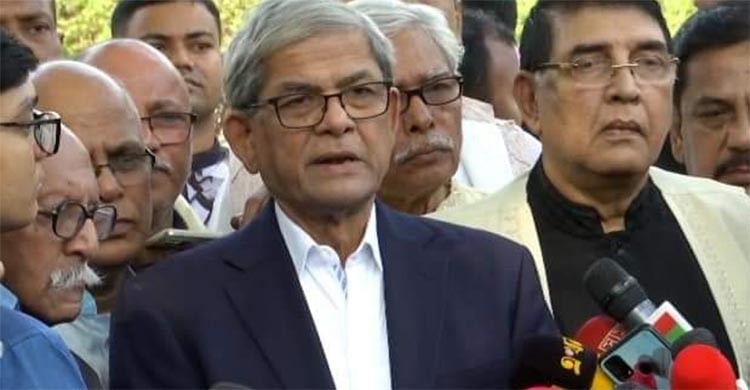Mirza Fakhrul questions probe into BDR mutiny
25 February 2023, 08:00 pm | Updated: 05 April 2025, 01:42 pm

BNP Secretary General Mirza Fakhrul Islam Alamgir on Saturday alleged that there was no proper investigation into the killings of 57 army officers in the BDR mutiny in 2009.
"We think the way this incident should have been investigated and the way the investigation process should have been conducted to bring out the real offenders and the masterminds through a fair investigation, that didn’t happen unfortunately,” he said.
Fakhrul came up with the remarks while talking to reporters after placing wreaths at a monument set up at Banani Army Graveyard in memory of the army officials killed in the Pilkhana carnage, marking the 14th anniversary of the incident.
He said the Army had conducted an investigation into the BDR mutiny incident, but the nation has not yet got the full report of that probe.
The BNP leader said some people were awarded death sentences and life imprisonment in a case filed in connection with the mutiny and subsequent killings.
But he lamented that the trial of another case filed under the Explosive Substances Act in connection with the same incident has not yet been completed, forcing many soldiers of the erstwhile Bangladesh Rifles (BDR) who claim themselves innocent still stay in jail.
"I was in prison a few days ago. I saw there that many ex-BDR members who were made accused in this case have been living inhumanly for 13/14 years. Their families and future are ruined,” Fakhrul said.
He demanded the government take steps to complete the trial in the explosive case so that those who are innocent can return to normal life with their families.
On 25-26 February 2009, a mutiny in the then Bangladesh Rifles (BDR) left 74 people, including 57 army officers, murdered at the Pilkhana Headquarters.
On 5 November 2013, a Dhaka court awarded death sentences to 150 BDR members and two civilians, and life imprisonment to 160 others in the case. On 27 November 2017, the High Court confirmed the death penalty for 139 out of 152 accused.
Following the heinous killings of the army officers at the Pilkhana headquarters, the government renamed the mutiny-hit paramilitary force BDR as Border Guard Bangladesh (BGB), changing its logo as well as uniform.
Fakhrul along with some ex-army officials went to the graveyard and placed wreaths at the monument and offered special prayers there seeking eternal peace of the departed souls of the slain army officers.
The BNP leader expressed deep homage to the slain army officers whom he described as the assets of the nation in protecting independence and sovereignty.
He also talked to Rakin Ahmed Bhuiyan, son of then BDR Director General Maj Gen Shakil Ahmed who was killed in the mutiny along with her wife.
The BNP leader said February 25 is a sad and scandalous day for the nation as 57 army officers were brutally killed along with their families, creating a reign of terror on that day 14 years back.
"It (Pilkhana carnage) was a conspiracy against the country, its independence and sovereignty. It’s also a plot to demoralise our army," he observed.
Fakhrul said the BDR mutiny was a serious onslaught on the country’s security system. “We did not lose so many army officers even during our great Liberation War.”
"It’s undoubtedly a conspiracy to kill in such a planned and brutal way those who took an oath to protect our independence and sovereignty even by sacrificing their lives,” he added.
Fakhrul also trashed Awami League joint General Secretary Mahbubul Alam Hanif’s allegation that BNP Chairperson Khaleda Zia's movement was suspicious since the morning on February 25, 2009.
“This is a completely irresponsible comment. Their (AL leaders) problem is that they always divert any incident to a different direction instead of unearthing the main reason and focusing on the main problem,” he said.
The BNP leader said the lack of democracy is the root cause of all problems in the country. “A strong unity of the nation is now necessary to get back the democratic system in the country. We also want to overcome all crises in the country by holding a free, fair, and acceptable election.”





















